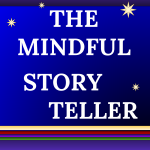
“In the stories we tell let the spoken word be…of a compelling and imaginative nature. Let it…charm the ear and arrest the mind, to build with perfection and delight…[to be] in itself…worth remembering. But let there be substance equally good.” – Ruth Sawyer, The Way of the Storyteller, p. 156-157.
∞∞∞∞∞∞∞∞
Ruth Sawyer says that our stories should be substantive. The Zen Buddhist monk Thich Nhat Hanh writes, “Seeing that words can create happiness or suffering, I am committed to speaking truthfully using words that inspire confidence, joy, and hope.” Are we committed to sharing or ingesting wholesome, substantive stories that speak truthfully and inspire confidence, joy, and hope? How many films have we seen that expose us and our loved ones to more horrific violence in the first fifteen minutes than anyone should be exposed to in an entire lifetime? Do we ever speak of the value of stories that are “wholesome”? Do we even utter the word “wholesome” except when speaking with irony or in mockery?
Many will argue that the term “wholesome” reeks of some past era when people practiced outer forms of politeness while subtly (and not-so-subtly) supporting violently oppressive systems and structures that elevated only a privileged few. Past and current oppression, systemic and otherwise, must be addressed – and, in fact, story is a key tool in educating and informing people about such injustices, but need we conflate wholesomeness with oppression?
Do people avoid speaking of “wholesomeness” because it alludes to privilege or do we avoid the term because it seems naive, absurd, childish? Perhaps we have grown so harshly sardonic that to speak of stories promoting basic goodness, as Ruth Sawyer and Thich Nhat Hanh suggest, is to risk ridicule, to risk being seen as unsophisticated. Speak of the value of “wholesome stories” and you may be seen as a simpleton who still thinks people can be “all nicey-nicey.”
C’mon, who ever speaks of “wholesomeness” as some positive trait and virtue these days? In just one of Thich Nhat Hanh’s books, he mentions “wholesome” ninety-eight times, but then his thinking was forged through his compassionate, nonviolent efforts at peace and healing within the fire of the Vietnam War. Perhaps someone who has experienced how brutal people can become when their cultures are destroyed and the people are immersed in violence, terror, and war, may recognize that wholesomeness is a value that should not be easily dismissed. Ninety-eight mentions in one book.
Ruth Sawyer says that we need stories that are compelling and imaginative, stories that “charm the ear and arrest the mind,” delightful tales that are “worth remembering,” and she adds emphatically, “Let there substance be equally good.” She follows this up by speaking of stories that evoke wonder, highlight daring, and bring laughter – but that is not all. Sawyer also calls for “stories that stir one within with an understanding of the true nature of courage, of love, of beauty…Stories that bring our minds to kneel in reverence; stories that show the tenderness of true mercy, the strength of loyalty, the unmawkish respect for what is good.” In other words, Ruth Sawyer tells storytellers that the wholesome story is needed. Thich Nhat Hanh agrees.
∞∞∞∞∞∞∞∞
You may have encountered wholesome stories through films, books, or conversations with family and friends. Recall a wholesome tale that touched you and watered beneficial seeds in your spirit. Take time to reflect on the story. What did you learn from it? How did it touch you? What details stand out? What brings this particular tale to mind?
Think of a wholesome story that you might want to share. It might be a story from your own life, maybe it’s one that you’ve read or heard from a friend. It might be a story that you’ve often reflected on, perhaps it’s one that just popped up. Muse on this tale. What details stand out? Why not share it with someone?
(Music: Courtesy of Adrian Von Ziegler, “Sacred Earth.” )